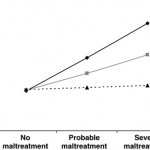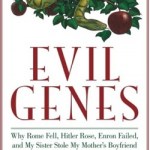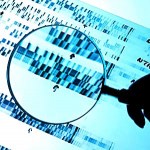genetics
Blogger Thomas Mailund is an author on a new paper, Ancestral Population Genomics: The Coalescent Hidden Markov Model Approach:
With incomplete lineage sorting (ILS), the genealogy of closely related species differs along their genomes. The amount of ILS depends on population parameters such as the ancestral effective population sizes and the recombination rate, but also on the number of generations between speciation events. We use a hidden Markov model parametrized according to coalescent theory in order to infer the genealogy along a four-species genome alignment of closely related species…
In the early 20th century the geographer Halford Mackinder posited that the key to world domination lay in the control of the Eurasian Heartland. This was in sharp contrast to Alfred Mahan's emphasis on the role of naval power. Whatever the applicability of these geopolitical frameworks in the modern era, it is interesting to observe their precedents in the ancient and medieval world. The rise of Rome was facilitated by the Mediterranean essential role as a conduit for communication and trade which connected the cities which were the foci of the Empire. Easy transport of cheap grain from…
I notice that Fortune has a story on personal genomics up, Genetic sequencing gets personal Biotech firm Illumina will sequence your entire genetic code -- and throw in a Mac -- for $48,000:
So far, personalized genomics make up just a small fraction of Illumina's revenue. High costs keep sequencing out of reach for most people. But prices will fall substantially as the technology improves. In fact experts say costs could reach $1000 within three to five years, making more people privy to their entire genetic code.
...
One area Illumina is not diving into is sequence analysis. Instead, it is…
In case you missed them (or miss them, and want to read again ...)
The (Illusory) Rise and Fall of the "Depression Gene"
DIY circumcision with nail clippers Go figure.
Oliver Sacks meets Jon Stewart
Wheels come off psychiatric manual; APA blames road conditions
Alarming climate change chart of the day
Swine flu count in US hits 1 million; can't wait till flu season!
Will government involvement drive up health-care costs?
What if you could predict PTSD in combat troops? Oh, who cares...
First Genetic Insight into Libyan Tuaregs: A Maternal Perspective:
The Tuaregs are a semi-nomadic pastoralist people of northwest Africa. Their origins are still a matter of debate due to the scarcity of genetic and historical data. Here we report the first data on the mitochondrial DNA (mtDNA) genetic characterization of a Tuareg sample from Fezzan (Libyan Sahara). A total of 129 individuals from two villages in the Acacus region were genetically analysed. Both the hypervariable regions and the coding region of mtDNA were investigated. Phylogeographic investigation was carried out in order…
This is a wonderful video: it's Richard Dawkins interviewing Craig Venter and getting a tour of his amazing sequencing facility. It also reveals how much the technology is changing.
A little under 10% of South Africa's population are Cape Coloureds. They speak Afrikaans and generally worship in Reformed Christian churches, but exhibit discernible non-European ancestry, in particular African ancestry. In the United States anyone who manifests African ancestry is coded as "black." Though hypodescent started out as a tool for maintaining white racial purity against colored taint, today it is accepted within black America as the social norm. Barack Obama has obvious mixed ancestry but he is accept as fully black racially by both black and white Americans. In South Africa…
Richard Wrangham has done a podcast over at World Science (see my review of Catching Fire). You can ask questions in the forum, Wrangham will be participating all week.
In an BBC article describing a Royal Society paper on the rate of mutation in warm vs. cooler climates, the BBC made this statement:
DNA can mutate and change imperceptibly every time a cell divides and makes a copy of itself.
But when one of these mutations causes a change that is advantageous for the animal - for example, rendering it resistant to a particular disease - it is often "selected for", or passed down to the next few generations of that same species.
Such changes, which create differences within a population but do not give rise to new species, are known as "microevolution".
I…
I wanted to draw attention to a new paper in JAMA recently because it reveals a lot about how conditional most of the statements we make in behavioral genetics are. Every time you hear a news article that says, "Gene for depression found," I want you to think about this case.
Risch et al. performed a meta-analysis on 14 studies that were looking at Serotonin Transporter (5-HTTLPR) genotype and number of stressful life events. These two factors were related to the subsequent risk for developing clinical depression. Their analysis found -- contrary to a very well known study, Caspi et al…
There is a reason why there are no dinosaur geneticists - their careers would quickly become as extinct as the 'terrible lizards' themselves. Bones may fossilise, but soft tissues and molecules like DNA do not. Outside of the fictional world of Jurassic Park, dinosaurs have left no genetic traces for eager scientists to study.
Nonetheless, that is exactly what Chris Organ and Scott Edwards from Harvard University have managed to do. And it all started with a simple riddle: which came first, the chicken or the genome?
Like almost all birds, a chicken's genome - its full complement of DNA…
tags: The Science of Story Telling, Paul Nurse, genetics, family history, narrative, streaming video
This video is a fascinating look at Paul Nurse's personal history .. Nurse, who is a biochemist, Knight, 2001 Nobel Prize Winner and President of Rockefeller University in NYC, reveals how, after 58 years, he finally learned the truth of his own family history. As a boy, Nurse always felt "a little bit different" from the rest of his family. His parents and siblings all left school at age 15 while he excelled at academics and pursued higher education. In his 30s, Nurse's mother confided in him…
This review was originally posted by Steinn Sigurðsson on Dynamics of Cats.
As I was strolling through town a few weeks ago, I saw a flyer advertising a talk on campus by Prof. Barbara Oakley, talking about her book "Evil Genes: Why Rome Fell, Hitler Rose, Enron Failed and My Sister Stole My Mother's Boyfriend."
I couldn't go to the talk, due to a conflicting engagement, but the book was in my review pile, so I popped it up to the top and plowed through it.
The book is quite a fun read.
It starts off as a personal story, with the death of the author's sister, and her reflection on the life…
Social insects like ants, bees and wasps are some of the most successful animals on the planet. By acting as large super-organisms, they can achieve things that larger singular creatures cannot.
Their astounding selflessness is driven by an unusual way of handing down their genes, which means that females actually have more genes in common with their sisters than they do with their own daughters. And that makes them more likely to put the good of their colony sisters over their own reproductive legacy.
The more related the workers are to each other, the more willing they will be to co-…
Common problem with loci presumed to have psychological or behavioral effects, Report on Gene for Depression Is Now Faulted:
The original finding, published in 2003, created a sensation among scientists and the public because it offered the first specific, plausible explanation of why some people bounce back after a stressful life event while others plunge into lasting despair.
The new report, by several of the most prominent researchers in the field, does not imply that interactions between genes and life experience are trivial; they are almost certainly fundamental, experts agree.
...
Since…
It's never made much sense to me why the pathogenic bacteria Salmonella and Shigella (which is really E. coli) have lost the ability to use lactose (milk sugar). In Shigella, we know that when we restore some lost functions through genetic manipulation (e.g., cadaverine production), they actually prevent these altered Shigella from causing disease. But lactose seems to be a good sugar to be able to grow on--they're exposed to it from time to time (in infants).
The genus Salmonella contains two species: S. enteriditis, which causes disease* and can't use lactose as a carbon source, and S.…
Dr. Daniel MacArthur has the must read post on the $48,000 whole-genome sequence. Dr. MacArthur notes that the price point isn't quite within reach for most of the population. Nevertheless, I do find it interesting that I asked Armand Leroi 4 years ago if he would forgo 1 month salary for a whole-genome sequence in 10 years. It looks like this will be possible much sooner than 2015.
All scientific laboratories are not created equal, a fact evident in the differences in regulations and expectations between large research centers and smaller-scale labs. As Mike the Mad Biologist explains, large genomics labs in particular are subject to productivity standards, such as the swift publicization of genomic sequence data, that smaller labs are not forced to comply with, largely due to the sources of their funding—large centers often operate on federal contract rather than grant money. Is this dichotomy fair to large genomics centers? Mike explains why it might be necessary,…
The locus MAOA pops up every year or so in a study which attempts to correlate variation in these region with behavior. In particular, anti-social or pathological behavior. So another one is out, Monoamine oxidase A genotype is associated with gang membership and weapon use:
The low MAOA activity alleles conferred an increased risk of joining a gang and using a weapon in a fight for males but not for females. Moreover, among male gang members, those who used weapons in a fight were more likely to have a low MAOA activity allele when compared with male gang members who do not use weapons in a…
Recently I've been seeing a lot of Chris Patil's posts over at Ouroboros on Twitter. Worth checking out. He's hosting on the Hourglass on the biology of aging right now, though readers of this weblog might find Did aging evolve to prevent epidemics? of more interest.


